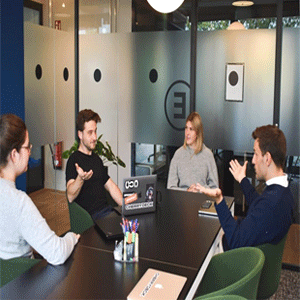Key Features To Look for in the Best Proposal Software
 With business competition becoming fiercer by the day, the ability to swiftly produce compelling, professional proposals can set an organization apart. Opting for the best proposal software can be a game-changer, enhancing productivity and boosting win rates. Critical functionalities range from design and customization to team collaboration and data analysis. Finding a robust solution that aligns with your business's needs is essential. Below, we delve into the foundational features that define the most effective proposal software solutions.
With business competition becoming fiercer by the day, the ability to swiftly produce compelling, professional proposals can set an organization apart. Opting for the best proposal software can be a game-changer, enhancing productivity and boosting win rates. Critical functionalities range from design and customization to team collaboration and data analysis. Finding a robust solution that aligns with your business's needs is essential. Below, we delve into the foundational features that define the most effective proposal software solutions.
Customization Capabilities to Reflect Your Brand's Identity
Top-notch proposal software provides extensive customization options. It should allow businesses to integrate their branding elements seamlessly into all proposal documents. This includes logos, color schemes, fonts, and other design elements that create a recognizably consistent look and feel representative of the brand.
Templates are a starting point but being able to modify and save bespoke templates tailors your proposals exactly to the occasion. Customizable fields and sections should be easily adjustable to address the specific requirements of each potential client or project. This level of personalization can greatly enhance the persuasiveness of a proposal.
The best tools also facilitate the customization of content for different audiences. This might mean automatic content adjustment based on the client's industry, size, or geographical location. By delivering relevant and targeted proposals, a software solution can significantly improve the likelihood of a positive response.
Lastly, attention to detail in the final presentation of your proposal can make all the difference. Software that offers a range of finishing touches, such as professional cover pages, interactive tables of contents, and elegant page transitions, can leave a lasting impression on the recipient.
Collaboration Tools for Team Efficiency and Real-time Editing
 Collaboration is the cornerstone of effective proposal mana- gement. The right software should boast features that allow multiple team members to work on the same document simul- taneously. Real-time editing capabilities can drastically reduce the time spent on back-and-forth communication and streamline the proposal development.
Collaboration is the cornerstone of effective proposal mana- gement. The right software should boast features that allow multiple team members to work on the same document simul- taneously. Real-time editing capabilities can drastically reduce the time spent on back-and-forth communication and streamline the proposal development.
Communication tools integrated into the software make it easier to discuss, review, and approve sections of the proposal without leaving the platform. This might include commenting systems, chat functions, and video conferencing features. Centralized communication can minimize misunderstandings and speed up project completion.
Enhanced permission settings within the software are vital for managing who has access to what. These settings help delegate tasks without risking unauthorized changes to critical document sections. Keeping everyone on the same page with task assignments and progress-tracking features ensures a smooth workflow.
Audit trails and notification systems within the software can inform everyone of changes, updates, or required actions. Alerts can prompt team members to review and approve content, keeping the project momentum. This maximizes team efficiency and greatly assists in meeting tight proposal deadlines.
Analyzing Success with Advanced Reporting Features and Analytics
Understanding the efficacy of your proposals is intrinsic to business growth. Proposal software offering advanced reporting and analytics can shed light on what's working and what isn't. Metrics like win rates, average time to close, and proposal view rates are invaluable in assessing performance.
Detailed analytics can assist in fine-tuning the proposal process. By identifying trends, such as which sections of a proposal most engage prospects, teams can replicate successful strategies in future proposals. Conversely, areas that consistently underperform can be reevaluated and improved.
Furthermore, generating custom reports allows managers to focus on the metrics that matter most to their business. Tailored reports can give a clearer picture of proposal ROI and aid in strategic decision-making. Teams can adjust their tactics based on concrete data, ensuring a more guided approach to proposal management.
The best proposal software for organizations looking to scale will feature forecasting tools. These tools can predict future trends based on historical data, giving businesses a competitive edge in planning and resource allocation. Accurate forecasts can be the difference between meeting sales targets and falling short.
Overall, the value proposition of the best proposal software lies in its ability to optimize each aspect of the proposal process. As businesses continue to prioritize efficiency and effectiveness, these systems are becoming indispensable tools for securing new clients and growing revenue streams. Considering these features will greatly assist in choosing a software solution that can transform your proposal writing from a routine task to a strategic asset.

